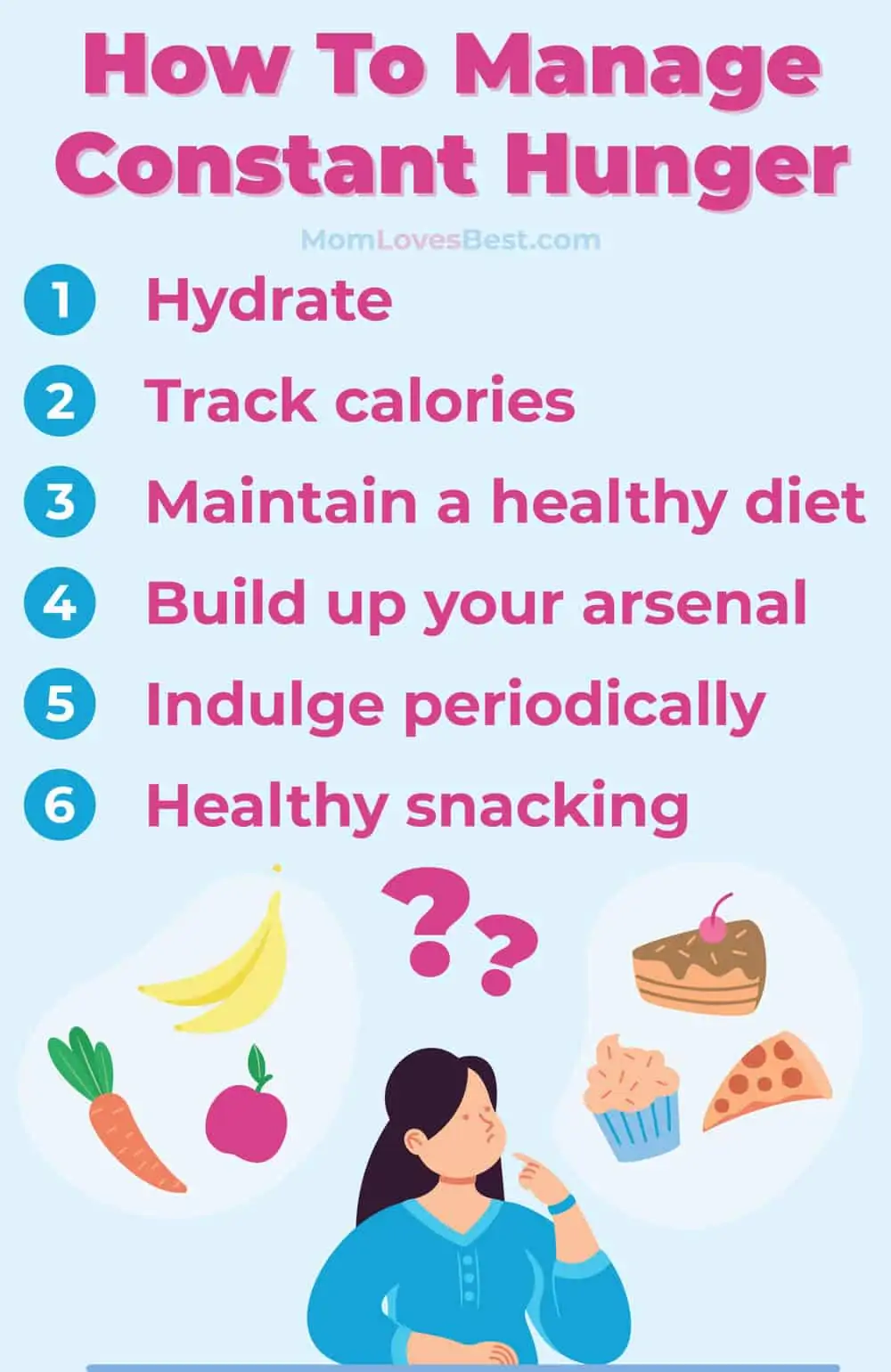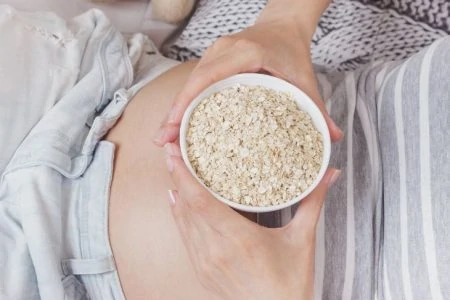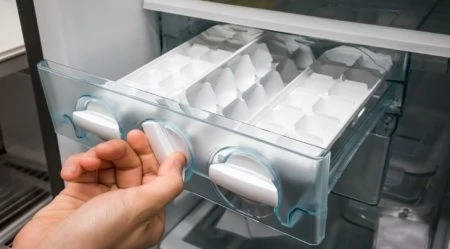It is normal to experience constant hunger during pregnancy. This often peaks during the second trimester when your energy returns and morning sickness fades. However, it is frustrating when you are trying to manage healthy weight gain.
It is easy to overeat when you have the “eating for two” excuse in your back pocket. But we all know that doubling your calories isn’t necessary; in fact, it can be unhealthy for both you and your baby.
In this article, we explain the science behind that ravenous appetite and offer simple tips to tame the hunger beast so you can stay healthy.
Key Takeaways
- Appetite usually increases in the second trimester once morning sickness subsides and the baby’s growth accelerates.
- Hunger pangs are caused by hormonal changes, an empty stomach, dehydration, or a need for specific nutrients.
- Combat constant hunger by prioritizing protein, fiber, and hydration rather than empty calories.
- Manage portion control by eating slower, using smaller plates, and snacking frequently on healthy options.
Why You Feel Hungry in Early Pregnancy
The struggle gets real in the first few months. You might be suffering from morning sickness, yet you still find your stomach growling constantly.
Many women experience increased appetite during the first trimester because vomiting leaves the stomach empty. If you can’t keep food down, your body isn’t absorbing nutrients, which triggers hunger signals.
Your body is working overtime to build a tiny human. Even if you feel nauseous, your metabolic needs are climbing.
This increased hunger is a signal to replenish your reserves. You must navigate the choppy waters of food aversions to find nutrient-dense foods you can tolerate.
Is Constant Hunger a Sign of Pregnancy?
You may experience specific food cravings or gnawing hunger very early on.
Hunger alone isn’t a definitive proof of pregnancy. However, if you pair that insatiable appetite with a missed period, tender breasts, and fatigue, you might want to take a test.
What Is a Hunger Pang?
Hunger pangs are strong contractions in the upper abdomen. When your stomach is empty, the inner lining becomes irritable and the walls rub together, causing that familiar gnawing sensation (1).
Pregnancy speeds up your metabolism, meaning your stomach empties faster after digestion. This leaves the lining exposed sooner, leading to more frequent pangs.
Pro Tip
Common Causes of Pregnancy Hunger Pangs
It is hard to pinpoint just one culprit, but several factors usually work together to ramp up your appetite:
- Your baby’s growth: The second and third trimesters are peak growth periods. Your baby demands more calories to build bone, muscle, and tissue. If you don’t meet this demand, your body will let you know loudly.
- Dehydration: The brain often confuses thirst for hunger. You need significantly more fluids to support increased blood volume and amniotic fluid. If you aren’t drinking enough, you might feel hungry when you are actually thirsty.
- Hormonal changes: Fluctuating hormones, specifically ghrelin and leptin, play a massive role in appetite regulation. These chemical shifts can make you feel starving even after a meal.
- Fast digestion: While progesterone usually slows digestion, your body processes simple carbs quickly. If you aren’t eating complex carbs or fiber, your stomach empties fast, leading to quick return of hunger.
Tips for Stopping Hunger Pangs
You cannot control your hormones, but you can control your habits. These steps helped us and many other moms keep the rumbling quiet.
- Eat regularly: Prevent your stomach from emptying completely. Grazing on six small meals is often better than three large ones.
- Pack an arsenal: Never leave the house without food. Keep emergency snacks like granola bars, trail mix, or dried dates in your purse to prevent blood sugar crashes.
- Prioritize hydration: Drink water throughout the day. Aim for about 10 cups of fluids daily, but sip slowly rather than chugging to avoid feeling uncomfortably full.
When Does Appetite Increase?
Most women notice a spike in hunger near the end of the first trimester or the start of the second.
Once the morning sickness fades, food finally sounds good again. This is often when the “makeup eating” begins, as you try to compensate for the weeks you couldn’t eat.
Does Appetite Decrease in the Third Trimester?
Many women notice their hunger subsides once they hit the home stretch.
Your baby is getting big, which leaves very little room for your stomach to expand. You simply cannot physically hold as much food as usual, causing your appetite to drop naturally.
Even if you don’t feel hungry, you must continue to eat. You need roughly 500 extra calories a day in the third trimester to support the final growth spurt (2). Focus on calorie-dense, healthy foods like avocados or nuts if you can’t handle large volume meals.
Focus on high protein and fiber-rich foods. Both will keep you fuller longer and are very important for your baby’s development. For example, a snack could be cheese and whole wheat crackers. For a meal, try cottage cheese on a salad.
Editor's Note:
Katelyn Holt RN, BSN, BCWhy You Feel Hungry 24/7
Your body is running a marathon every single day. It works night and day to sustain you and build a new life.
Think about the energy required to create a heart, brain, and skeletal system. It is incredible work. All that energy comes directly from the food you consume.
Your body burns calories faster than usual to fuel this process. This rapid burn rate triggers your brain to demand more fuel constantly (3).
Listen to your body. Do not feel guilty about digging for a snack. Relax and remember that those nutrients are going to a good cause.
How To Manage Constant Hunger
Pregnancy hunger can feel overwhelming, but you need a strategy to keep it subdued without gaining excessive weight. Do not ignore the hunger; manage it smartly.
1. Hydrate First
We mention hydration often because it is vital. Our bodies easily trick us into confusing hunger with pregnancy dehydration.
If you feel a sudden pang, drink a glass of water and wait 10 minutes. The hunger often passes.
2. Watch Your Calories
Some women assume pregnancy is a free pass to eat everything. While you need more food, there are limits.
You usually don’t need extra calories in the first trimester. You should consume about 300 extra calories per day in the second trimester and 500 in the third. If you are carrying twins, you will need more.
Remember
3. Choose Nutrient-Dense Foods
It is tempting to grab chips or cookies, but these empty calories burn off fast and leave you hungry again an hour later.
Opt for foods rich in protein, healthy fats, and fiber. These nutrients digest slower and keep you fuller longer. Fresh foods are generally better than processed options.
4. Stock Up on Healthy Options
Willpower is hard when you are exhausted. Make it easy on yourself by prepping healthy snacks in advance.
Keep sliced fruit, cheese sticks, hard-boiled eggs, and yogurt accessible. If healthy food is ready to eat, you are less likely to grab the junk food.
5. Don’t Be Afraid to Indulge
Depriving yourself completely leads to binge eating later. Reward yourself occasionally.
If you crave ice cream, have a small bowl. The goal is the “80/20 rule”, eat healthy 80% of the time and allow yourself treats the other 20%.
6. Snack smartly
Eating huge meals can make you feel sluggish and contribute to heartburn. Focus on snacking.
Take a cooler to work with hummus, veggies, and berries. This keeps your metabolism steady and prevents the ferocious hunger that leads to overeating at dinner.
When I was pregnant, I never left the house without my water bottle in my hand and a granola bar and a banana in my purse.
Editor's Note:
Katelyn Holt RN, BSN, BCManaging Your Weight When Pregnant
Weight gain is expected, but controlling the rate of gain is important for your health. These tips help balance hunger with weight management (4):
- Eat frequent, small meals rather than large feasts.
- Prioritize water over sugary juices or sodas.
- Pair your cravings with nutrition (e.g., chocolate with nuts).
- Exercise regularly. Walking helps regulate blood sugar and appetite.
Talk to your doctor about your specific weight gain goals. Your BMI at the start of pregnancy usually determines the recommended range.
How to Eat Less and Still Feel Full
You don’t need a three-course meal to feel satisfied. Use these tricks to hack your brain and stomach into feeling full on appropriate portions.
- Slow down: Your brain takes about 20 minutes to register fullness. Chew your food thoroughly and put your fork down between bites.
- Divide your portions: Instead of eating a massive lunch, save half for a mid-afternoon snack. This keeps your blood sugar stable.
- Distract your mind: Boredom often masks itself as hunger. If you just ate but feel “snackish,” try a hobby, a walk, or a household chore to redirect your brain.
FAQs
The Bottom Line
Hunger is an inevitable part of the journey. Expecting yourself to consume the same amount of food as before is unrealistic when you are actively growing a human.
Your body needs extra calories to stay well-nourished and healthy during pregnancy. Do not feel guilty about eating more. You are burning fuel at a high rate, and you need that energy to keep your baby growing strong.














